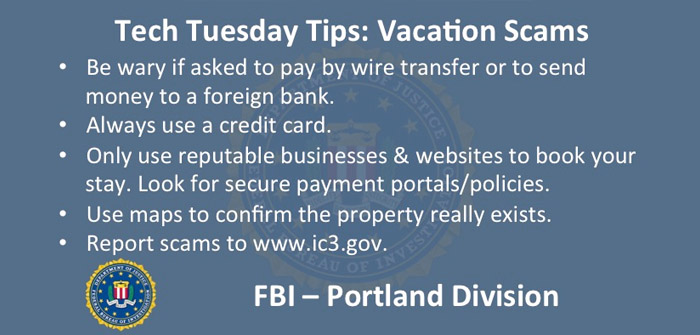The kids are almost out of school, and the weather is warming up… definitely a good time to start planning your next escape out of town. It seems like it has never been easier to find the perfect space in the perfect place to take your family. Want to rent a condo for a few nights in the big city? A cottage in the woods? Or a bungalow by the beach? There are tons of options for every kind of possible vacation, and you can find them all with a few quick clicks on the keyboard.
Our friends at the Federal Trade Commission, though, have some advice to help make sure that your quest for rest and relaxation doesn’t lead you to a rental scam.
Here’s how it can work: you find a great house or apartment listed for rent on the internet. The photos look great, and the rates are somewhere between very low and reasonable. You make contact with the person you think is the owner, book a date and pre-pay some or all of your fee. In some cases, a fraudster may have just lifted the info and pictures from a real listing and re-posted them elsewhere. He changes the contact info so you come to him, not the owner, and now he’s making money.
In other cases, the fraudster posts a phantom listing… the rental doesn’t really exist. He promises all kinds of amenities, and you think you’ve just snagged a great option at a low price. All he has to do is get you to pay up before you figure things out.
Here’s how to protect yourself:
- Be wary if the owner asks you to pay by wire transfer. This is like sending cash – you likely will never get your money back if there’s a problem. Use a credit card.
- Watch out if the owner says he is overseas and wants you to send a deposit to a foreign bank. If you are traveling overseas, again, your best bet is to use a credit card.
- Consider only using a reputable travel website to book your stay. Look for sites that use secure payment portals and/or those that don’t release the payment to the owner until you’ve checked in.
- Use mapping apps — like Google maps or similar — to confirm that the property really exists.
Remember – if you have been victimized by an online scam, you can report your suspicious contacts to the FBI. You can file an online report at the FBI’s Internet Crime Complaint Center at ic3.gov or call your FBI local office.





